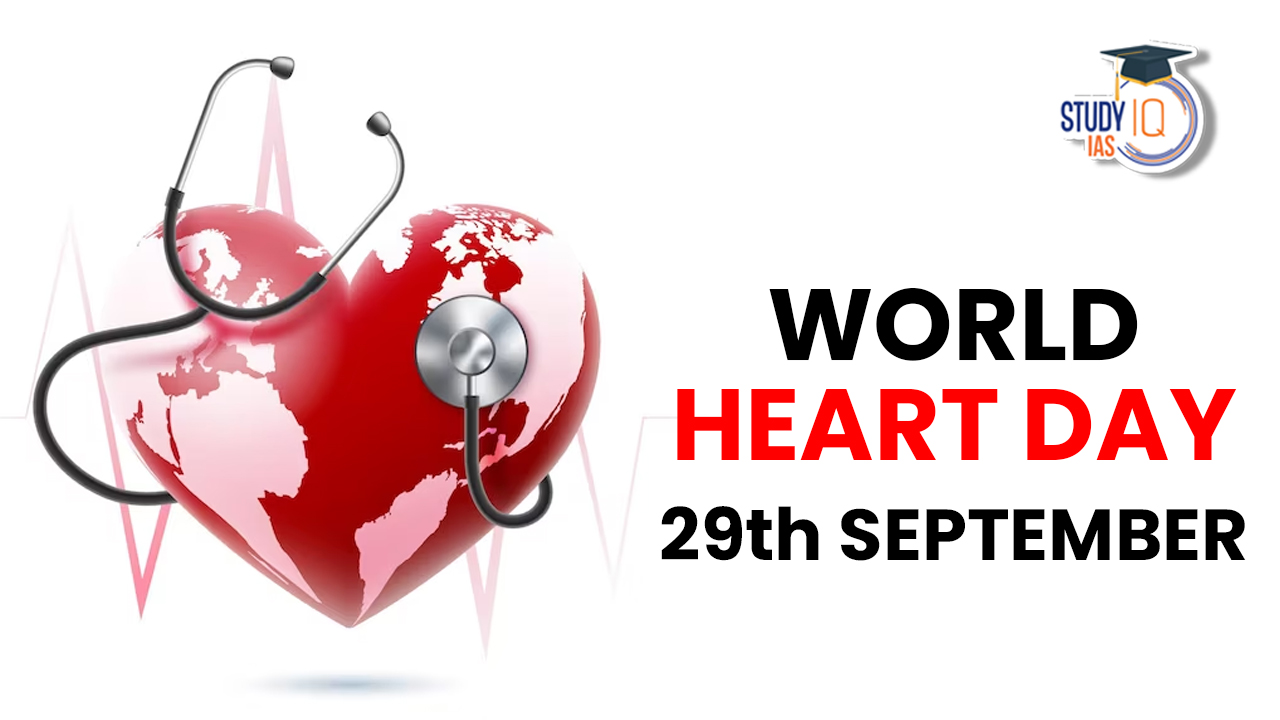Table of Contents
World Heart Day 2024
World Heart Day is observed annually on September 29 to raise global awareness about cardiovascular diseases (CVDs), which remain the leading cause of death worldwide. The day emphasizes the importance of heart health and encourages individuals, communities, and policymakers to take proactive measures to prevent heart-related ailments. For UPSC aspirants, understanding the significance of this day is crucial for grasping the public health challenges faced globally, especially in India, where cardiovascular diseases are increasingly prevalent.
World Heart Day 2024 Theme
The theme for World Heart Day 2024, running until 2026, is “Use Heart for Action”. This theme represents a dynamic shift in the approach to heart health awareness, transitioning from merely raising awareness to driving concrete action. It focuses on three key areas:
- Empowerment: The campaign encourages individuals to take control of their heart health by adopting healthy habits such as regular exercise, balanced diets, and managing stress levels. It also emphasizes the importance of routine health check-ups to monitor cardiovascular health.
- Advocacy: The theme pushes for systemic changes, urging leaders and policymakers to prioritize cardiovascular health. This includes promoting heart-healthy environments through public health campaigns, smoking cessation programs, and creating policies that reduce heart disease risk factors.
- Dual Approach: “Use Heart for Action” promotes a two-pronged strategy — influencing policies at the governmental level while encouraging individual behavioral changes to reduce the risk of CVDs. It highlights the need for collaboration across sectors to implement sustainable solutions for heart health.
This theme is significant because it mobilizes both individuals and governments to work together in combating cardiovascular diseases effectively, making it highly relevant for UPSC candidates studying public health and governance.
World Heart Day History
World Heart Day has a history that dates back to the year 2000 when it was first established by the World Heart Federation (WHF). The WHF is a global organization that prevents heart disease and promotes heart health.
World Heart Day aims to raise awareness about heart diseases, their prevention, and the importance of a healthy heart. It’s a day when people worldwide come together to focus on their heart health and encourage others to do the same. Here’s a simple timeline of how World Heart Day has evolved:
- 2000: The WHF created World Heart Day to inform people about the growing threat of heart disease and stroke worldwide.
- 2001: The first World Heart Day was celebrated on September 24, 2001. The WHF chose September 24 because it marks the anniversary of the WHF’s establishment in 1950.
- 2012: The WHF and the World Health Organization (WHO) joined forces to promote World Heart Day, making it an even more significant global health event.
- 2019: The WHF and its partners launched the “My Heart, Your Heart” campaign, emphasizing the importance of heart-healthy environments and the role of individuals in heart health.
- 2020: World Heart Day took on added importance during the COVID-19 pandemic, as heart health became a crucial concern for people of all ages.
How Can You Protect Your Heart?
To know your heart better and maintain good heart health, you can:
- Monitor your Blood Pressure: High blood pressure increases the risk of heart problems. Keep your blood pressure within the normal range, which is usually between 90/60mmHg and 120/80mmHg.
- Check your Heart Rate: Understand your heart rate, which is the speed at which your heart beats. A normal heart rate is typically between 60 to 100 beats per minute. Your heart rate can give insights into your heart’s health.
- Get a Blood Test: A blood test can measure substances like sodium, potassium, and creatinine, which are linked to your heart health.
- Manage Cholesterol Levels: High levels of bad cholesterol can clog your arteries and increase the risk of heart attacks. Maintain healthy cholesterol levels through regular blood tests and lifestyle changes.
World Heart Day 2024 aims to remind everyone of the importance of heart health and encourage them to take steps to protect their hearts by using simple, universally understood symbols and gaining knowledge about heart diseases and preventive measures.
World Heart Day Significance
Cardiovascular diseases account for an estimated 18.6 million deaths annually, making them the world’s leading cause of death. World Heart Day plays a critical role in:
- Raising Awareness: It educates people about the causes of heart diseases, such as smoking, poor diet, lack of exercise, and high stress, which are preventable through lifestyle changes.
- Promoting Preventive Measures: World Heart Day encourages adopting healthier lifestyles, which include a heart-friendly diet, regular physical activity, and quitting harmful habits like smoking and excessive alcohol consumption.
- Reducing the Global Burden of CVDs: Awareness campaigns help reduce the incidence of cardiovascular diseases by promoting early detection and management of conditions like hypertension, diabetes, and high cholesterol.
- Policy Advocacy: World Heart Day also serves as a platform to advocate for policy changes that promote heart-healthy environments, such as creating smoke-free zones, improving access to healthier food options, and expanding healthcare services.
10 Important Measures to Keep Our Hearts Healthy
To keep our hearts healthy, there are ten important things we should know:
- The Heart’s Role: The heart pumps blood to provide oxygen and nutrients to our body’s organs and tissues. It’s essential for overall health.
- Healthy Diet: Eating well is crucial for heart health. Include fruits, vegetables, whole grains, lean proteins, and healthy fats in your diet. Avoid foods high in saturated fats, trans fats, salt, and added sugars.
- Risk Factors: Some key factors that increase the risk of heart disease include high blood pressure, high cholesterol, smoking, obesity, diabetes, family history, and a lack of physical activity. You can check your risk through medical check-ups and assessments by healthcare professionals.
- Exercise: Aim for at least 150 minutes of moderate-intensity aerobic exercise or 75 minutes of vigorous exercise each week. Activities like brisk walking, swimming, and cycling are good for your heart.
- Blood Pressure: It’s important to monitor your blood pressure because high blood pressure can harm your heart. Healthy blood pressure is typically around 120/80 mm Hg.
- Signs of Heart Problems: Be aware of signs like chest pain, shortness of breath, fatigue, palpitations, dizziness, and swelling in the legs. If you experience these, seek medical help.
- Lifestyle Changes: You can reduce the risk of heart disease by quitting smoking, maintaining a healthy weight, exercising regularly, eating a balanced diet, limiting alcohol, managing stress, and getting regular check-ups.
- Cholesterol: Cholesterol is a substance in your blood. High levels of bad cholesterol (LDL) can increase the risk of heart disease. You can manage it with diet, exercise, and medications if prescribed by a doctor.
- Heart-Healthy Habits: To manage stress, try relaxation techniques like meditation, deep breathing, yoga, and balancing work and life. Staying active and connecting with loved ones can also help your heart.
- Regular Check-ups: Visit your healthcare provider regularly for heart health check-ups and screenings. They can advise how often based on your risk factors and medical history. Usually, it’s recommended annually or as your doctor suggests.
Global Impact of World Heart Day
Over the years, World Heart Day has evolved into a global movement, uniting governments, healthcare organizations, and the public in the fight against cardiovascular diseases. The day is marked by various activities, including:
- Free Heart Screenings: Many health organizations offer free heart health check-ups to encourage early detection.
- Walks and Marathons: Physical activity campaigns like marathons and walks are organized to promote the importance of exercise in maintaining heart health.
- Media Campaigns: Social media, television, and radio are used to spread messages about heart disease prevention and heart-healthy lifestyles.


 Pariksha pe Charcha 2025, Overview, Even...
Pariksha pe Charcha 2025, Overview, Even...
 Languages of the World List, Most Spoken...
Languages of the World List, Most Spoken...
 Vijay Hazare Trophy 2024, Schedule, Team...
Vijay Hazare Trophy 2024, Schedule, Team...




















